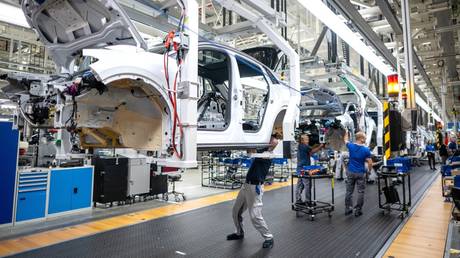EU car industry braces for a 'horror fall' – Bild
The EU automobile market is currently facing “harder” times than it did during the Covid-19 pandemic, according to an expert's statement to the German tabloid.. source:TROIB RTS

EU automakers are experiencing their most challenging months since the Covid-19 pandemic, as reported by the German tabloid Bild on Thursday, referencing a notable industry figure.
In the first eight months of 2024, car sales within the bloc have decreased by 200,000 vehicles compared to the same period in the previous year, with projections indicating further deterioration, according to Ferdinand Dudenhoeffer.
Dudenhoeffer, who is the founder and former director of the Center for Automotive Research—a private institute focused on industry analysis and transport policy—highlighted that sales of electric cars have declined by 8.3% from last year, resulting in 140,000 fewer models sold through August.
“Important large car markets such as Germany and Italy were already slightly down in the first eight months of the year,” he remarked, cautioning that the situation “is not getting better.”
As automakers grapple with these losses, Dudenhoeffer noted they are attempting to recoup by raising prices, with the 20 most popular gasoline-powered car models now around 10% more expensive.
“The next few months will be very difficult for the industry. Worse than it was during [the Covid-19 pandemic],” he forecasted, adding that Germany is likely to be particularly impacted, with market recovery not anticipated before 2026.
Recently, Volkswagen, the EU’s largest car manufacturer, disclosed plans to contemplate plant closures or layoffs in Germany for the first time in its 87-year history. This announcement came alongside the decision to terminate its employment security program, which had been established to postpone job cuts until at least 2029.
In early September, Oliver Blume, CEO of Volkswagen Group, described the current state of the automobile market as “highly challenging and serious,” noting that the potential for “plant closures are no longer excluded.” However, the company did not clarify how many of its 120,000 employees in Germany might face layoffs.
Germany had already experienced a recession in late 2023, and official statistics indicate that Europe’s largest economy also contracted in the second quarter of this year. Reuters reported in September that the decline in the automotive sector was a primary factor behind the reduction in the country’s industrial production in July, raising concerns that Germany could face another recession.
Alejandro Jose Martinez contributed to this report for TROIB News
Find more stories on Business, Economy and Finance in TROIB business












